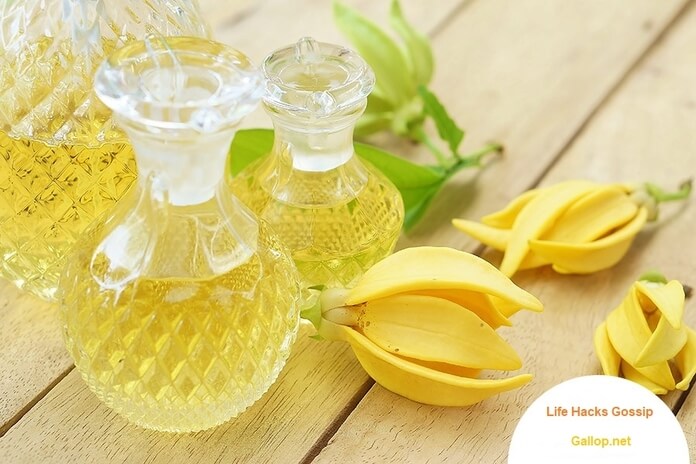The Benefits of Ylang Ylang Oil
Ylang Ylang oil, extracted from the flowers of the Cananga tree, is a well-loved essential oil with numerous health benefits.
From enhancing skin health to promoting relaxation, the benefits of Ylang Ylang oil are vast and varied.
This article delves into the myriad advantages of incorporating Ylang Ylang oil into your wellness routine.
Skin Health and Beauty with Ylang Ylang Oil
Ylang Ylang oil, derived from the flowers of the Cananga tree, is renowned for its numerous health benefits.
This article explores the benefits of Ylang Ylang oil, focusing on its role in enhancing skin health and beauty.
From balancing oil production to providing anti-aging benefits, Ylang Ylang oil is a versatile and valuable addition to any skincare routine.
Understanding Ylang Ylang Oil
For many people, maintaining healthy skin is essential, and Ylang Ylang oil can significantly contribute to achieving this goal.
Extracted through steam distillation, Ylang Ylang oil boasts a sweet, floral scent that is both uplifting and soothing.
Its unique properties make it an excellent choice for addressing various skin concerns.
Balancing Oil Production
One of the primary benefits of Ylang Ylang oil is its ability to balance oil production.
Whether you have oily or dry skin, Ylang Ylang oil can help regulate sebum production.
For instance, oily skin can lead to acne breakouts, while dry skin can cause flakiness and irritation.
By using Ylang Ylang oil, you can achieve a more balanced complexion.
In some cases, individuals with combination skin find it challenging to manage different areas of their face.
Ylang Ylang oil can be particularly beneficial in such scenarios, providing the right amount of moisture without clogging pores or causing excessive dryness.
Anti-Aging Properties
The anti-aging benefits of Ylang Ylang oil are noteworthy.
The oil helps maintain skin elasticity, reducing the appearance of fine lines and wrinkles.
If you’re someone who is concerned about the signs of aging, incorporating Ylang Ylang oil into your skincare regimen can make a significant difference.
The great thing about Ylang Ylang oil is its ability to stimulate cell regeneration.
This property helps in repairing damaged skin and promoting a youthful glow.
For best results, consider adding a few drops of Ylang Ylang oil to your daily moisturizer or serum.
Acne Treatment
Ylang Ylang oil’s antibacterial properties make it effective in treating acne.
By combating acne-causing bacteria, the oil helps prevent breakouts and promotes clearer skin.
Many people find that regular use of Ylang Ylang oil reduces the severity and frequency of acne flare-ups.
The benefits of Ylang Ylang oil extend to reducing acne scars and blemishes.
Its healing properties aid in diminishing the appearance of past breakouts, leaving the skin smoother and more even-toned.
For an effective acne treatment, mix Ylang Ylang oil with a carrier oil like jojoba or almond oil and apply it to the affected areas.
Soothing Irritated Skin
If you’re someone who deals with skin irritation or inflammation, Ylang Ylang oil can offer relief.
The oil’s anti-inflammatory properties help soothe irritated skin, reducing redness and swelling.
This makes it an excellent option for those with sensitive skin or conditions like eczema and psoriasis.
In some cases, skin irritation can result from environmental factors such as pollution or harsh weather conditions.
Applying Ylang Ylang oil can create a protective barrier on the skin, shielding it from potential irritants and promoting overall skin health.
Enhancing Overall Skin Health
The comprehensive benefits of Ylang Ylang oil contribute to overall skin health.
The oil’s antioxidant properties protect the skin from free radical damage, which can cause premature aging and other skin issues.
By neutralizing these harmful molecules, Ylang Ylang oil helps maintain a healthy and radiant complexion.
For many people, incorporating Ylang Ylang oil into their skincare routine involves using it in various ways.
You can add it to your bath for a relaxing soak, use it as a massage oil, or include it in your facial treatments.
Its versatility makes it easy to reap the benefits of Ylang Ylang oil in multiple aspects of your skincare regimen.
Real-World Comparisons
Comparing the benefits of Ylang Ylang oil to other essential oils can help illustrate its unique advantages.
For example, while lavender oil is well-known for its calming properties, Ylang Ylang oil offers a more exotic, floral scent that also promotes relaxation.
Both oils can be used for stress relief, but Ylang Ylang oil’s distinct fragrance sets it apart.
When it comes to skincare, Ylang Ylang oil can be compared to tea tree oil.
Tea tree oil is famous for its potent antibacterial properties, making it a popular choice for acne treatment.
However, Ylang Ylang oil provides a more balanced approach by regulating oil production and offering anti-aging benefits, making it suitable for a broader range of skin types.
User Reviews and Case Studies
User reviews and case studies provide practical insights into the benefits of Ylang Ylang oil.
Many individuals have reported significant improvements in their skin health after using Ylang Ylang oil regularly.
For instance, a case study involving a woman with chronic acne showed a noticeable reduction in breakouts and an overall improvement in skin texture after incorporating Ylang Ylang oil into her routine for six weeks.
Another user review highlighted the oil’s effectiveness in soothing irritated skin.
The individual noted that applying Ylang Ylang oil mixed with a carrier oil helped reduce redness and inflammation, resulting in calmer and healthier-looking skin.
These real-world examples underscore the practical benefits of Ylang Ylang oil in everyday skincare.
Practical Tips for Using Ylang Ylang Oil
To maximize the benefits of Ylang Ylang oil, it’s essential to use it correctly. Here are some practical tips:
- Dilution: Always dilute Ylang Ylang oil with a carrier oil before applying it to your skin. This prevents irritation and ensures even distribution.
- Patch Test: Conduct a patch test before using Ylang Ylang oil on your face or body. Apply a small amount to a discreet area of your skin and wait 24 hours to check for any adverse reactions.
- Consistency: For best results, use Ylang Ylang oil consistently. Incorporate it into your daily skincare routine to experience its full benefits over time.
- Storage: Store Ylang Ylang oil in a cool, dark place to preserve its potency and extend its shelf life.
Conclusion
In conclusion, the benefits of Ylang Ylang oil for skin health and beauty are extensive and well-documented.
From balancing oil production to providing anti-aging properties, this versatile essential oil can address a wide range of skincare concerns.
By incorporating Ylang Ylang oil into your daily routine, you can achieve healthier, more radiant skin.
Whether you’re dealing with acne, irritation, or signs of aging, Ylang Ylang oil offers a natural and effective solution.
Its unique properties, combined with its soothing fragrance, make it a valuable addition to any skincare regimen.
With regular use, you’ll find that Ylang Ylang oil can significantly enhance your skin’s health and beauty, helping you achieve a glowing complexion and overall well-being.
10 Customized Hair Oil Formulas with Ylang-Ylang for Different Skin Types
Here are five formulas for preparing oil blends with Ylang Ylang and other essential oils, each tailored to a specific skin type:
1. Formula for Oily Skin
Ingredients:
- 10 drops Ylang Ylang essential oil
- 10 drops Tea Tree essential oil
- 10 drops Lavender essential oil
- 2 tablespoons Jojoba oil (carrier oil)
Instructions:
- Mix all the essential oils with the Jojoba oil in a small glass bottle.
- Shake well to blend the oils.
- Apply a few drops to clean skin, massaging gently in circular motions.
Benefits:
- Ylang Ylang balances oil production.
- Tea Tree has antibacterial properties to prevent acne.
- Lavender soothes inflammation and promotes healing.
- Jojoba oil mimics the skin’s natural sebum, reducing overproduction.
2. Formula for Dry Skin
Ingredients:
- 10 drops Ylang Ylang essential oil
- 10 drops Geranium essential oil
- 10 drops Frankincense essential oil
- 2 tablespoons Avocado oil (carrier oil)
Instructions:
- Combine all the essential oils with the Avocado oil in a small glass bottle.
- Shake well to blend the oils.
- Apply a few drops to clean skin, massaging gently to ensure absorption.
Benefits:
- Ylang Ylang hydrates and balances the skin.
- Geranium improves skin elasticity and tightens skin.
- Frankincense nourishes and rejuvenates dry skin.
- Avocado oil deeply moisturizes and nourishes the skin.
3. Formula for Sensitive Skin
Ingredients:
- 10 drops Ylang Ylang essential oil
- 10 drops Chamomile essential oil
- 10 drops Sandalwood essential oil
- 2 tablespoons Sweet Almond oil (carrier oil)
Instructions:
- Mix all the essential oils with the Sweet Almond oil in a small glass bottle.
- Shake well to blend the oils.
- Apply a few drops to clean skin, massaging gently and avoiding sensitive areas like the eyes.
Benefits:
- Ylang Ylang soothes and balances sensitive skin.
- Chamomile calms irritation and redness.
- Sandalwood has anti-inflammatory and healing properties.
- Sweet Almond oil is gentle and hydrating for sensitive skin.
4. Formula for Combination Skin
Ingredients:
- 10 drops Ylang Ylang essential oil
- 10 drops Clary Sage essential oil
- 10 drops Patchouli essential oil
- 2 tablespoons Grapeseed oil (carrier oil)
Instructions:
- Combine all the essential oils with the Grapeseed oil in a small glass bottle.
- Shake well to blend the oils.
- Apply a few drops to clean skin, focusing on areas that need balancing.
Benefits:
- Ylang Ylang regulates oil production.
- Clary Sage balances sebum and reduces inflammation.
- Patchouli helps heal and rejuvenate the skin.
- Grapeseed oil is light, non-greasy, and balances combination skin.
5. Formula for Mature Skin
Ingredients:
- 10 drops Ylang Ylang essential oil
- 10 drops Rose essential oil
- 10 drops Myrrh essential oil
- 2 tablespoons Rosehip oil (carrier oil)
Instructions:
- Mix all the essential oils with the Rosehip oil in a small glass bottle.
- Shake well to blend the oils.
- Apply a few drops to clean skin, focusing on areas prone to fine lines and wrinkles.
Benefits:
- Ylang Ylang promotes cell regeneration and balances the skin.
- Rose essential oil hydrates and reduces the appearance of wrinkles.
- Myrrh enhances skin elasticity and provides antioxidant benefits.
- Rosehip oil is rich in vitamins A and C, improving skin texture and reducing signs of aging.
General Tips for Use:
- Perform a patch test before using any new essential oil blend to ensure no allergic reactions.
- Store the oil blends in dark glass bottles to protect them from light and preserve their efficacy.
- Use the oils as part of your nightly skincare routine for best results.
These formulas are designed to address the unique needs of different skin types, providing the benefits of Ylang Ylang oil in combination with other complementary essential oils.
Hair Care with Ylang Ylang Oil: Unlocking the Secrets to Luscious Locks
When it comes to hair care, natural remedies are gaining popularity for their effectiveness and gentle touch.
One such gem is Ylang Ylang oil, renowned for its numerous benefits.
In this article, we’ll delve into the Benefits of Ylang Ylang Oil for hair care, exploring how it can transform your hair health and beauty.
Understanding the Benefits of Ylang Ylang Oil
Ylang Ylang oil, extracted from the flowers of the Cananga tree, boasts a delightful floral scent and a plethora of therapeutic properties.
The Benefits of Ylang Ylang Oil for hair care are manifold, ranging from improving hair texture to promoting growth and reducing hair loss.
Promoting Hair Growth
For many people struggling with hair growth issues, Ylang Ylang oil can be a game-changer.
Its ability to stimulate blood circulation to the scalp is key. Improved blood flow ensures that hair follicles receive essential nutrients and oxygen, promoting healthier and faster hair growth.
Benefits of Ylang Ylang Oil include its natural ability to boost hair growth, making it a preferred choice for those seeking thicker, longer hair.
Strengthening Hair Strands
In some cases, weak and brittle hair is a major concern.
Ylang Ylang oil’s moisturizing properties help strengthen hair strands from root to tip.
When applied regularly, it can prevent hair breakage and split ends, leaving your hair looking robust and healthy.
Benefits of Ylang Ylang Oil also extend to its ability to enhance hair elasticity, reducing the chances of damage.
Balancing Sebum Production
If you’re someone who struggles with an oily scalp or dry hair, Ylang Ylang oil can help balance sebum production.
This balance is crucial for maintaining a healthy scalp environment.
An oily scalp can lead to dandruff and other scalp issues, while a dry scalp can cause itching and flakiness.
The Benefits of Ylang Ylang Oil include regulating sebum production, ensuring your scalp and hair remain well-nourished and balanced.
Reducing Hair Loss
Hair loss is a common issue many people face, often leading to frustration and a search for effective solutions.
The Benefits of Ylang Ylang Oil in reducing hair loss are well-documented.
By improving scalp health and strengthening hair follicles, Ylang Ylang oil can significantly reduce hair shedding and promote the retention of healthy hair.
How to Use Ylang Ylang Oil for Hair Care
To reap the Benefits of Ylang Ylang Oil, it’s essential to know how to use it effectively.
Here are some practical ways to incorporate this essential oil into your hair care routine:
Scalp Massage
One of the simplest and most effective ways to use Ylang Ylang oil is through scalp massage.
Dilute a few drops of Ylang Ylang oil with a carrier oil, such as coconut or jojoba oil.
Massage this blend into your scalp for about 5-10 minutes.
This not only promotes relaxation but also improves blood circulation, enhancing hair growth and overall scalp health.
Hair Mask
If your hair needs deep conditioning, consider adding Ylang Ylang oil to your hair mask.
Mix a few drops of the oil with your favorite hair mask or conditioner and apply it to your hair.
Leave it on for 20-30 minutes before rinsing thoroughly.
The Benefits of Ylang Ylang Oil in a hair mask include intense hydration and nourishment, leaving your hair soft and manageable.
Leave-In Treatment
For a daily boost, add a drop or two of Ylang Ylang oil to your leave-in conditioner or serum.
This method ensures that your hair receives continuous nourishment and protection throughout the day.
The Benefits of Ylang Ylang Oil in a leave-in treatment include smoother hair texture and added shine.
Real-World Comparisons and User Experiences
What’s interesting here is that many users have shared their positive experiences with Ylang Ylang oil for hair care.
For example, Sarah, a regular user, noticed a significant reduction in hair breakage and increased shine after incorporating Ylang Ylang oil into her routine.
Similarly, John, who struggled with an oily scalp, found that Ylang Ylang oil helped balance his scalp’s oil production, leading to healthier hair.
Interactive Elements and Comparisons
To help you understand the Benefits of Ylang Ylang Oil, let’s compare it with other popular essential oils used in hair care:
| Essential Oil | Key Benefits | User Experience |
|---|---|---|
| Ylang Ylang | Promotes growth, strengthens hair, balances sebum | Positive reviews for growth and shine |
| Tea Tree | Anti-dandruff, reduces scalp irritation | Effective for dandruff but can be drying |
| Lavender | Soothes scalp, promotes growth | Calming effect, mixed results for growth |
| Peppermint | Stimulates scalp, enhances growth | Cooling sensation, boosts circulation |
This comparison highlights the unique advantages of Ylang Ylang oil, particularly its versatility and effectiveness in addressing various hair concerns.
Regular Updates and Practical Advice
To keep your hair care routine updated with the latest trends, it’s important to regularly revisit and adjust your use of Ylang Ylang oil.
For instance, during dry winter months, you might need more hydration, so consider increasing the frequency of your Ylang Ylang oil treatments.
Conversely, in humid conditions, you might reduce the application to prevent excess oiliness.
Conclusion
In conclusion, the Benefits of Ylang Ylang Oil for hair care are extensive and well-supported by both scientific research and user testimonials.
From promoting hair growth and strengthening strands to balancing sebum production and reducing hair loss, Ylang Ylang oil is a versatile and effective addition to any hair care routine.
By understanding how to use it properly and staying updated with the latest trends and user experiences, you can unlock the full potential of Ylang Ylang oil for healthier, more beautiful hair.
For many people, Ylang Ylang oil is a hidden gem in their hair care arsenal.
Whether you’re looking to address specific hair issues or simply want to enhance your hair’s natural beauty, Ylang Ylang oil offers a natural, effective solution.
So why not give it a try and experience the transformative benefits for yourself?
Customized Hair Care: 10 Essential Oil Blends with Ylang Ylang for Every Hair Type
Ylang Ylang Oil is widely celebrated for its beauty benefits, particularly in the realm of hair care.
With its ability to nourish, promote hair growth, and balance oil production, Ylang Ylang Oil is a fantastic addition to your hair care routine.
In this article, we’ll explore 10 essential oil blends using Ylang Ylang Oil and other essential oils, tailored for different hair types.
We’ll guide you through each formula, explaining the ingredients, instructions, benefits, and general tips to help you achieve healthy, vibrant hair.
1. Ylang Ylang Oil and Lavender for Dry Hair
Dry hair can often feel rough and lackluster. The soothing, moisturizing properties of Ylang Ylang Oil combined with the calming and hydrating effects of Lavender Essential Oil make this blend a perfect remedy for dry hair.
Ingredients:
- 50 ml Coconut Oil (Carrier Oil)
- 20 drops Ylang Ylang Essential Oil
- 15 drops Lavender Essential Oil
- 5 drops Geranium Essential Oil (optional)
Instructions:
- In a clean, dark glass bottle, mix the coconut oil with Ylang Ylang and Lavender oils.
- Shake the bottle gently to combine the oils.
- Massage the blend into the scalp and apply to the lengths of your hair, especially the ends.
- Leave the oil on for 30 minutes before washing it off with a gentle shampoo.
Benefits:
This blend deeply moisturizes dry hair, adds shine, and helps restore balance to your scalp. The Benefits of Ylang Ylang Oil include its ability to stimulate oil production, which can balance dryness.
2. Ylang Ylang Oil and Rosemary for Oily Hair
If you have oily hair, it’s essential to regulate the oil production on your scalp without stripping your hair of its natural oils.
Ylang Ylang Oil paired with Rosemary Essential Oil helps control oil production and promotes hair growth.
Ingredients:
- 50 ml Jojoba Oil (Carrier Oil)
- 20 drops Ylang Ylang Essential Oil
- 15 drops Rosemary Essential Oil
- 5 drops Tea Tree Essential Oil (optional)
Instructions:
- Combine the jojoba oil with Ylang Ylang and Rosemary oils in a glass bottle.
- Gently shake to mix.
- Apply the blend directly to the scalp, massaging it for 5-10 minutes.
- Leave it on for 20-30 minutes, then wash with a clarifying shampoo.
Benefits:
This oil blend regulates excess oil and nourishes the scalp without causing buildup. The Benefits of Ylang Ylang Oil in this recipe include its ability to restore balance to the scalp and promote healthier hair growth.
3. Ylang Ylang Oil and Chamomile for Sensitive Scalps
If you have a sensitive scalp, this gentle blend of Ylang Ylang Oil and Chamomile Essential Oil can help calm irritation and soothe inflammation.
Ingredients:
- 50 ml Sweet Almond Oil (Carrier Oil)
- 20 drops Ylang Ylang Essential Oil
- 15 drops Chamomile Essential Oil
- 5 drops Lavender Essential Oil
Instructions:
- Mix the sweet almond oil with Ylang Ylang and Chamomile oils in a dark glass bottle.
- Shake well to ensure thorough blending.
- Massage the oil into the scalp and leave it on for 30-40 minutes before washing with a mild shampoo.
Benefits:
This formula offers soothing relief for irritated or inflamed scalps. The Benefits of Ylang Ylang Oil in this combination help balance sebum levels and support a calm, healthy scalp.
4. Ylang Ylang Oil and Sandalwood for Thick, Coarse Hair
Thick, coarse hair can be hard to manage and often requires deep conditioning.
Sandalwood’s rich moisturizing properties, combined with the strengthening effects of Ylang Ylang Oil, provide intense hydration and softness.
Ingredients:
- 50 ml Argan Oil (Carrier Oil)
- 20 drops Ylang Ylang Essential Oil
- 15 drops Sandalwood Essential Oil
- 5 drops Frankincense Essential Oil (optional)
Instructions:
- In a clean glass bottle, mix Argan oil with Ylang Ylang and Sandalwood oils.
- Shake to combine.
- Apply the blend generously to your hair, focusing on the ends.
- Leave it on for 30-40 minutes before rinsing thoroughly.
Benefits:
This oil blend softens and tames thick hair, making it more manageable. The Benefits of Ylang Ylang Oil promote healthier follicles, which can lead to shinier, more vibrant hair.
5. Ylang Ylang Oil and Tea Tree for Dandruff-Prone Hair
Dandruff can be an annoying problem, but with this blend of Ylang Ylang Oil and Tea Tree Essential Oil, you can fight flakes while nourishing your scalp.
Ingredients:
- 50 ml Grapeseed Oil (Carrier Oil)
- 20 drops Ylang Ylang Essential Oil
- 15 drops Tea Tree Essential Oil
- 5 drops Rosemary Essential Oil (optional)
Instructions:
- Mix the grapeseed oil with Ylang Ylang and Tea Tree oils in a dark glass bottle.
- Shake gently to combine the oils.
- Massage the blend into your scalp, leaving it for 20-30 minutes before washing with an anti-dandruff shampoo.
Benefits:
Tea Tree Oil helps combat dandruff, while Ylang Ylang Oil balances the scalp. The Benefits of Ylang Ylang Oil include its ability to enhance scalp health and reduce flakiness.
6. Ylang Ylang Oil and Carrot Seed for Hair Growth
If you’re looking to boost hair growth, this blend of Ylang Ylang Oil and Carrot Seed Essential Oil is perfect.
Carrot Seed Oil is known for its ability to stimulate blood circulation and promote healthier hair growth.
Ingredients:
- 50 ml Castor Oil (Carrier Oil)
- 20 drops Ylang Ylang Essential Oil
- 15 drops Carrot Seed Essential Oil
- 5 drops Rosemary Essential Oil (optional)
Instructions:
- In a glass bottle, combine castor oil with Ylang Ylang and Carrot Seed oils.
- Shake gently to mix.
- Apply to the scalp, massaging in circular motions for 5-10 minutes.
- Leave it on for 1 hour, then rinse with a mild shampoo.
Benefits:
This blend stimulates hair follicles, promoting growth and thickness. The Benefits of Ylang Ylang Oil in this formula include its ability to improve blood circulation and nourish hair roots.
7. Ylang Ylang Oil and Geranium for Oily, Fine Hair
Geranium Essential Oil is known for balancing oil production and giving fine hair a boost.
When combined with Ylang Ylang Oil, this blend helps hydrate while adding volume to fine hair.
Ingredients:
- 50 ml Jojoba Oil (Carrier Oil)
- 20 drops Ylang Ylang Essential Oil
- 15 drops Geranium Essential Oil
- 5 drops Lavender Essential Oil (optional)
Instructions:
- Mix jojoba oil with Ylang Ylang and Geranium oils in a dark glass bottle.
- Shake well to blend.
- Apply to scalp and hair, massaging for 5-10 minutes.
- Leave it on for 20 minutes, then wash with a gentle shampoo.
Benefits:
Geranium helps regulate sebum production, while Ylang Ylang nourishes the scalp. This blend helps fine hair appear thicker and healthier.
8. Ylang Ylang Oil and Frankincense for Dry, Damaged Hair
If your hair is dry or damaged from heat styling or environmental factors, Frankincense Essential Oil combined with Ylang Ylang Oil can help repair and protect your strands.
Ingredients:
- 50 ml Olive Oil (Carrier Oil)
- 20 drops Ylang Ylang Essential Oil
- 15 drops Frankincense Essential Oil
- 5 drops Lavender Essential Oil
Instructions:
- Mix olive oil with Ylang Ylang and Frankincense oils.
- Shake gently to combine.
- Massage into the hair and scalp, leave on for 30 minutes, then wash off with a gentle shampoo.
Benefits:
This blend promotes hair regeneration, adds moisture, and repairs damage. The Benefits of Ylang Ylang Oil make this formula ideal for dry, brittle hair.
9. Ylang Ylang Oil and Bergamot for Normal Hair
For those with normal hair, this blend of Ylang Ylang Oil and Bergamot Essential Oil works to maintain balance and promote overall hair health.
Ingredients:
- 50 ml Avocado Oil (Carrier Oil)
- 20 drops Ylang Ylang Essential Oil
- 15 drops Bergamot Essential Oil
- 5 drops Chamomile Essential Oil
Instructions:
- Mix the oils in a glass bottle and shake gently.
- Apply to the scalp and hair, leave on for 15-20 minutes, and rinse thoroughly.
Benefits:
This blend helps balance the scalp’s natural oils, keeping your hair healthy and vibrant. The Benefits of Ylang Ylang Oil include its ability to support scalp health and enhance hair strength.
10. Ylang Ylang Oil and Lavender for Relaxation and Hair Nourishment
Combining the calming effects of Lavender Oil with the nourishing qualities of Ylang Ylang, this blend is perfect for promoting relaxation while nourishing the scalp and hair.
Ingredients:
- 50 ml Coconut Oil (Carrier Oil)
- 20 drops Ylang Ylang Essential Oil
- 15 drops Lavender Essential Oil
Instructions:
- Mix the oils in a dark glass bottle.
- Shake gently and apply to the scalp, massaging it in for 5-10 minutes.
- Leave it on for 30 minutes before washing with a gentle shampoo.
Benefits:
This blend calms the mind and nourishes the scalp, providing a holistic approach to hair care. The Benefits of Ylang Ylang Oil include its ability to stimulate hair growth and improve scalp health.
Conclusion
The Benefits of Ylang Ylang Oil are undeniable when it comes to hair care.
Whether you have dry, oily, fine, or damaged hair, incorporating Ylang Ylang into your routine can make a noticeable difference.
These 10 DIY oil formulas offer something for everyone, helping you achieve healthier, more vibrant hair with the power of natural essential oils.








